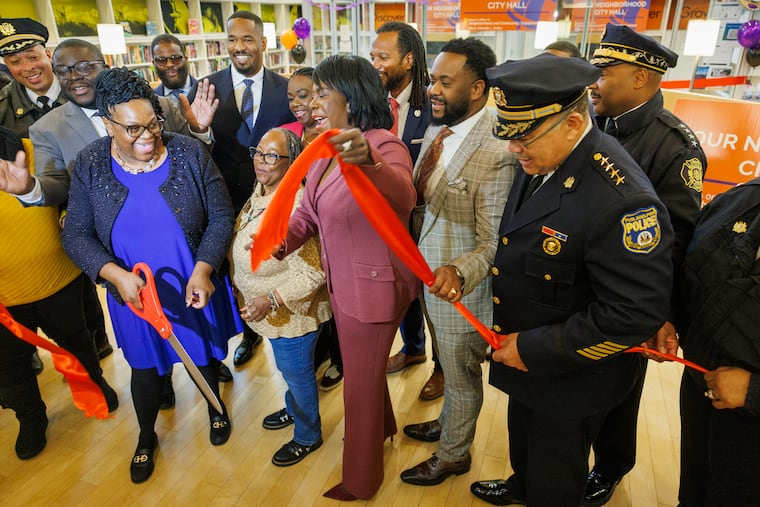Mayor Cherelle Parker establishes ‘mini City Halls’ in 11 neighborhoods for Philly residents to access city services
The centers will offer a way to seek municipal services while providing a link to the administration through “community councils.”

Mayor Cherelle L. Parker’s administration announced Friday that it is establishing 11 “mini City Halls” across Philadelphia where residents can request services like graffiti removal or traffic calming, part of the mayor’s vow to make city functions more accessible.
The “community action centers” will be based in recreation centers and libraries around the city, with one in each of the city’s geographically based councilmanic districts. Each center will be staffed with liaisons who will log requests from residents and community organizations, then follow up to ensure they were fulfilled.
“The people of Philadelphia, they are tired of speeches from those who are elected to public office,” Parker said during remarks at the Logan Public Library in North Philadelphia, where one of the new centers will be located. “They want to see, in a very tangible way, in their own respective lives, government at work in their communities.”
Staff at the community action centers will also convene so-called community councils, or advisory boards of residents who can bring neighborhood-level concerns to the administration’s attention. The creation of those councils fulfills a key first-year promise for Parker, who said while campaigning that she would lean on boards of residents to inform decisions on policy.
The new community action centers will connect residents with services in a way that’s similar to how City Council members who represent geographic districts provide constituent services. Parker acknowledged that there may be overlap but said Friday that the effort is not duplicative, but rather offers residents another way to seek services, in addition to calling 311.
“This represents addition and not subtraction,” she said, adding that she knows critics may say the new centers “are in competition with members of City Council, particularly the district Council members, or they’re in competition with the state representatives and the state senators.”
Parker said anyone making that argument is “narrow-minded” and thinking “small.”
“We could put 1,100 centers up, and it still wouldn’t be enough to fix all the problems and provide all the supports and services,” she said.
Parker was joined Friday by top administration officials and several other elected officials, including City Councilmember Anthony Phillips, who represents the 9th District, where the library is located. Parker represented the district before she resigned in 2022 to run for mayor.
Phillips said the administration establishing its own presence in Council districts and providing residents with a connection to basic city services could allow lawmakers to focus their attention elsewhere.
“Legislators, particularly in the state House and also City Council, we really should focus on, as much as possible, legislation, initiatives, and programs and partnerships that can really help our district grow,” he said. Phillips added that Parker’s administration is “making city services accessible so that other leaders and community folks can focus on other things.”
A spokesperson said seven of the neighborhood-based centers do not yet have opening dates, and the mayor’s office did not provide the locations of those centers.
The four centers that have confirmed opening dates are:
Logan Library, 1333 Wagner Ave., which opened Tuesday.
Daroff School, 5630 Vine St., which will open Monday.
Church of Christian Compassion, 6150 Cedar Ave., which will open Dec. 3.
Hayes Recreation Center, 9800 Roosevelt Blvd., which will open Dec. 20.